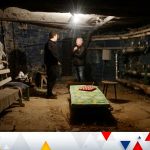A woman who killed her father by setting his house on fire was recorded on hidden devices watching a TV show about the cold case.
Lynne Martin was found guilty of murder in Gisborne, New Zealand, on Wednesday, 10 years after killing her father in an arson attack.
She was accused of starting the fire that killed him by leaving a pot of oil on the stove when the 88-year-old was asleep.
In 2020, the case featured on Cold Case, a New Zealand crime-solving series.
Martin’s house had been bugged by police. As she watched the show and in the hours afterwards, her conversations with her husband were recorded, New Zealand news website Stuff reported.
The programme mentioned a phone call Martin had made to her father, Ronald Russell Allison, the day before his death.
“There was nothing, there was no malice in it, no nothing; he was in good spirits,” she told her husband.
Asked by her husband if she “had a go at him”, she replied “Oh f***, I was always having a go at the c***, but I can’t say that”.
After watching the TV show she told her husband “they can put me down there, but it doesn’t prove I went to Whatatutu [her father’s house], it doesn’t prove I set the house on fire”.
The conversations were among 22,000 recordings made on hidden devices and through bugs on Martin’s phones.
Read more from Sky News:
Mother’s ‘nightmare’ as son among four teens found dead in Wales
Ousted Sam Altman to return as OpenAI chief executive
An undercover police office also spent 157 days establishing Martin’s involvement with the fire, Stuff reported.
Using the name Millie Tait, the undercover officer struck up a friendship with Martin and told her that her ex-boyfriend was blackmailing her because he had a diary in which she confessed to a hit-and-run.
Martin told Millie to “torch the house” to destroy the evidence, telling her “arson is the easiest thing in the world and very hard to prove”.
Cooking fat on the stove was the best way of starting the fire, she said, and she also warned the officer not to take her mobile phone and not to leave fingerprints or DNA.
Martin’s instructions on starting a fire led police to instruct a fire expert to test whether the blaze at Mr Allison’s house could have been started using that method, the New Zealand Herald reported. Results showed it was likely.
Mobile phone data was one of the prosecution’s pieces of evidence. While Martin denied being near her father’s house on the night of his death, phone tower records showed she was in the area for about two hours.
The prosecution argued Martin killed her father because she was bankrupt and wanted the $150,000 (£72,000) inheritance she would get when he died.
Martin was remanded in custody until sentencing.






















